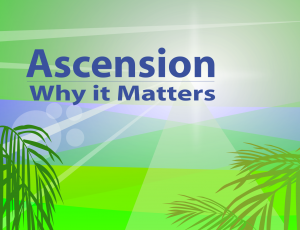Ascension: Why it Matters

Ascension, the remembrance of Jesus’ rise from his disciples’ presence into the Father’s presence, is easy to miss. Being celebrated 40 days after Easter Day, it always falls on a Thursday. The following Sunday is Pentecost, the celebration of the Holy Spirit coming to the disciples assembled in Mark’s mother’s house, which is commonly called the Upper Room. The upshot is that no preacher is under pressure to pay attention to the Ascension. In turn, it can fall off the calendar and not be missed by the Church for years at a time.
Another factor influences the attention we pay to Ascension. Only Luke narrates it. Matthew’s resurrection section presents Jesus as if he has already ascended and his presence with the disciples vacillates over the 40 days following Easter. Neither John nor Mark narrate a scene quite like the one at the end of Luke which is repeated in the first chapter of his Acts of the Apostles.
The Ascension seems important to me this year for two reasons:
What the Ascension Says about Us
First, it confronts me with the startling thought that Jesus, the Second Person of the Trinity, doesn’t turn back into a spirit or some non-human form as he rejoins the Father as one-third of the community of the Trinity. Put bluntly, God has some human elements.
God has some human elements
This thought retrieves the statement made in Genesis at the time of the creation of humans, that we were made “in God’s image.” Apparently, humans were enough like God that one of us, Jesus could return to the Father and not change form in any way in order to be suitable for fellowship with the Father. That rising from earth into Heaven reverses the action of God coming down in the Incarnation.
Christians are accustomed to hearing how Jesus reflects God’s being. We learn a lot about God by paying attention to what Jesus did, what he deemed important, how he treated people, and so on. Less appreciated, is that when we look at Jesus, we are also looking at ourselves and our own awesome potential. There is nothing about our being that prevents us from living majestic lives of generative power, as did Jesus. We know that because there is no difference in our essence and that of the one who sits at the Father’s right side as the Second Person of the Trinity.
What the Ascension Says about the World
Second, the Ascension is political. The tyrants of the First Century, indeed the tyrants of every age, had a yearning to present themselves as little gods. Maybe they didn’t think they were so little. At the time of their deaths, they would arrange for someone to report that they had seen the ruler’s deathless soul rising into the sky.
Augustus, the emperor who reigned when Jesus was born, opportunistically seized upon the advent of a comet as the sign that he was alive overseeing his empire. I’ve heard stories that flunkies were assigned the task of releasing an eagle from beneath the funeral pyre that consumed the body of a deceased Roman emperor. Unfortunately, too many people knew about the ruse, and rumors about the faked eagle-soul of the dead emperor contributed to the general cynicism of the latter years of Rome’s dominance.
For Jesus to rise into heaven is a forthright political statement. It confronts Rome’s pretensions to be the greatest and final power over all human affairs.
For Jesus to rise into heaven is a forthright political statement.
Significantly, Jesus ascended into heaven in the first chapter of the Acts of the Apostles. As he reigns at God’s right hand, his followers carry his message out in concentric circles to the “ ends of the earth.” The triumph in heaven is mirrored by his triumph in the world.
What the Ascension says about our human being and what it says about who runs the world are still both compelling truths in our own time of flux both in understanding who we are and what values rule the world.
